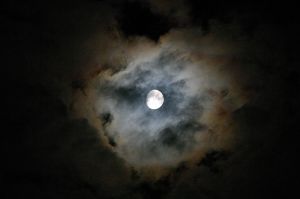
In honour of the Supermoon (see pretty pictures here and here) I thought I’d throw together some Shakespeare quotes about the moon. It’s something he talks about often – and in a lot of different ways.
The moon’s phases are a metaphor for changeability – who can forget the “the fickle moon, the inconstant moon, that monthly changes in her circle orb” in Romeo and Juliet? And again in Henry V – “a good heart, Kate, is the sun and the moon; or, rather, the sun, and not the moon; for it shines bright and never changes, but keeps his course truly”. In Antony and Cleopatra, it is “the visiting moon” beneath which “there is nothing left remarkable”. And in Othello, “Think’st thou I’d make a lie of jealousy, To follow still the changes of the moon With fresh suspicion”.
The moon is seemingly never good for love. When not fickle, it is lacking in passion – Falstaff’s “noble and chaste mistress the moon” in Henry IV Part I, the “cold fruitless moon” in A Midsummer Night’s Dream which also causes Theseus to complain “but, O, methinks, how slow This old moon wanes! she lingers my desires”. She is not even to be trusted – in Hamlet “The chariest maid is prodigal enough If she unmasks her beauty to the moon”. Almost the only exception is The Merchant of Venice, where “the moon sleeps with Endymion And would not be awaked”.
The moon is often downright dangerous. In Othello “She comes more nearer earth than she was wont And makes men mad” and eclipses – in King Lear “These late eclipses in the sun and moon portend no good to us”, in Macbeth the witches collect “Gall of goat, and slips of yew Silver’d in the moon’s eclipse”. Oberon was “Ill met by moonlight” in A Midsummer Night’s Dream.
Again in A Midsummer Night’s Dream, the moon is “the governess of floods / Pale in her anger, washes all the air”, and a watery connection is also common. In Richard III, Elizabeth “being governed by the watery moon, May send forth plenteous tears to drown the world”. And as The Winter’s Tale correctly points out, “you may as well / Forbid the sea for to obey the moon”.
Finally, the moon is itself – but as only Shakespeare could put it. “The moon’s an arrant thief, And her pale fire she snatches from the sun”. I am looking forward to Timon of Athens.


